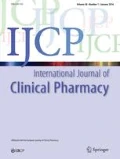Abstract
Objective A lack of skilled health professionals, and net migration from developing to more developed countries, are widely recognised as barriers to the delivery of effective health care. However, few studies have investigated this issue from the perspective of pharmacists, although they are increasingly viewed as a potentially valuable and underexploited health care resource. The objectives of this study were to examine the professional aspirations and perceived opportunities of final year pharmacy students in a developing country; and consider what developments may encourage them to remain in, and contribute to, health care in their home country. Method Final year pharmacy students from the Faculty of Pharmacy, KNUST, Kumasi, Ghana, were randomly selected and invited to participate in in-depth interviews. These were audio-recorded (with permission of respondents) and transcribed verbatim to enable a qualitative analysis. Main outcome measure: professional aspirations, and perceived opportunities and barriers to their achievement in Ghana and abroad. Results Participants viewed themselves, and wished to be viewed by others, as health professionals. They described a commitment to applying their clinical knowledge and to education beyond their first degree. However, they identified significant barriers to the achievement of professional aspirations in Ghana, which would diminish their opportunities to contribute to health care. Whilst most students expressed the expectation or desire to travel at some point, usually early, in their career, they all demonstrated a commitment to their country and stated a wish to return. Conclusion Overall the study highlighted prospective pharmacists in Ghana as ambitious, committed potential health professionals. The study indicates that a lack of attention by policy makers and professional bodies to ways of exploiting the contribution of pharmacists to public health, may represent a lost potential human resource for health in developing countries.
Similar content being viewed by others
References
World Health Organisation. Working together for health: The World Health report 2006. Geneva: WHO; 2006. ISBN: 92 4156317 6.
Buchan J, Sochalski J. The migration of nurses: trends and policies. Bull World Health Organ. 2004;82:5887–94.
Connell J, Zurn P, Stilwell B, Awases M, Braichet J-M. Sub-Saharan Africa: beyond the health worker migration crisis. Social Sci Med. 2007;64:1876–91.
Eastwood JB, Convey RE, Naicker S, West PA, Tutt RC, Plange-Rhule J. Loss of health professionals from subSaharan Africa: the pivotal role of the UK. Lancet. 2005;365:1893–900.
Diallo K. Data on the migration of healthcare workers: sources, uses and challenges. Bull World Health Organ. 2004;82:601–7.
Dovlo D. Taking more than a fair share? The migration of health professionals from poor to rich countries. PloS Med. 2005;2:376–9.
Marchal B, Kegels G. Health workforce imbalances in times of globalization: brain drain of professional mobility? Int J Health Plan Manage. 2003;18:S89–101.
Stilwell B, Diallo K, Zurn P, Vujicic M, Adams O, Dal Poz M. Migration of health care workers from developing countries: strategic approaches to its management. Bull World Health Organ. 2004;82:595–600.
Astor A, Akhtar T, Matallana MA, Muthuswamy V, Olowu FA, Tallo V, Lie RK. Physician migration: views from professionals in Colombia, Nigeria, India, Pakistan and the Philippines. Social Sci Med. 2005;61:2492–500.
Saravia NG, Miranda JF. Plumbing the brain drain. Bull World Health Organ. 2004;82:608–15.
Muula AS. Is there any solution to the ‘brain drain’ of health professionals and knowledge from Africa? Croat Med J. 2005;46:21–9.
Kupfer L, Hofman K, Jarawan R, McDermott J, Bridbord K. Strategies to discourage the brain drain. Bull WHO. 2004;82:616–9.
Martineau T, Decker K, Bundred P. ‘Brain drain’ of health professionals: from rhetoric to responsible action. Health Policy. 2004;70:1–10.
Schmid K. Strategies to manage migration of health professionals. Bull World Health Organ. 2004;82:621–2.
Fritzen SA. Strategic management of the health workforce in developing countries: what have we learned? Hum Resour Health. 2007;5:4.
Lucas AO. Human resources for health in Africa. BMJ. 2005;331:1037–8.
World Health Organisation. The role of the pharmacist in the health care system. Geneva: WHO; 1990. WHO/PHARM/DAP/90.1.
World Health Organisation. Good pharmacy practice: guidelines in community and hospital pharmacy settings. Geneva: WHO; 1996. www.who.int.
Smith FJ. Community pharmacy in Ghana: enhancing the contribution to primary health care. Health Policy Plan. 2004;19:234–41.
Anderson S. The state of the world’s pharmacy: a portrait of the pharmacy profession. J Interprof Care. 2002;16:391–404.
Wuliji T. FIP. Global pharmacy workforce and migration report: a call for action. Int Pharm J. 2006;20:2–4.
Dayrit MM, Dolea C. The health workforce crisis: where are the pharmacists? Int Pharm J. 2006;20:5–7.
Owusu-Daaku FTK. Pharmacy in Ghana’s healthcare system: which way forward? Ghana Pharm J. 2002;25:20–3.
FIP. Global pharmacy workforce and migration report: a call for action. The Hague: FIP; 2006. www.fip.org/hr.
Matowe L, Duwiejua M, Norris P. Is there a solution to the pharmacist brain drain from poor to rich countries? Pharm J. 2004;272:98–9.
Smith FJ. Research methods in pharmacy practice. London: Pharmaceutical Press; 2002. ISBN: 0 85369 481 8.
Harding G, Taylor K. Pharmacy as a profession. In: Taylor K, Harding G, editors. Pharmacy practice. London: Taylor and Francis; 2001. ISBN: 0 415 27159-2.
Hagopian A, Ofosu A, Fatusi A, Biritwum R, Essel A, Hart LG, Watts C. The flight of physicians from West Africa: views of African physicians and implications for policy. Social Sci Med. 2005;61:1750–60.
Acknowledgements
We would like to thank all the students in Ghana who enthusiastically shared their views, expectations and experiences in the interviews.
Financial support of the study
We would like to thank the British Council administered DFID funding a Higher Education Link between the Faculty of Pharmacy, Kumasi, Ghana and the School of Pharmacy, University of London as part of which this study was undertaken.
Conflicts of interest
There are no conflicts of interest.
Author information
Authors and Affiliations
Corresponding authors
Rights and permissions
About this article
Cite this article
Owusu-Daaku, F., Smith, F. & Shah, R. Addressing the workforce crisis: the professional aspirations of pharmacy students in Ghana. Pharm World Sci 30, 577–583 (2008). https://doi.org/10.1007/s11096-008-9214-7
Received:
Accepted:
Published:
Issue Date:
DOI: https://doi.org/10.1007/s11096-008-9214-7




